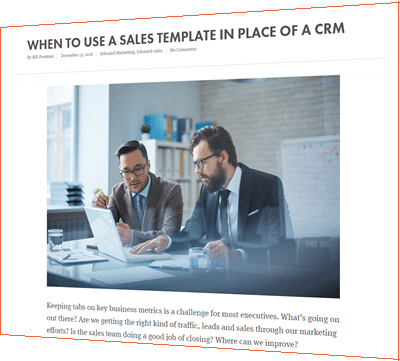 My partner, Mike Garland, was the CMO of a technology company and was directed to hire the staff he needed to “get inbound marketing done.” After five months, the team was still not up-to-speed with inbound marketing, and the results were negligible. We have great compassion for this problem, and have worked with many HubSpot customers in similar situations.
My partner, Mike Garland, was the CMO of a technology company and was directed to hire the staff he needed to “get inbound marketing done.” After five months, the team was still not up-to-speed with inbound marketing, and the results were negligible. We have great compassion for this problem, and have worked with many HubSpot customers in similar situations.
Many B2B companies “drank the Kool-aide” and adopted marketing automation and inbound marketing, thinking it would help them grow revenue and customer satisfaction.
And yes, inbound marketing powered by HubSpot or other providers CAN do that. The thing that some companies miss is the tremendous amount of human capital needed to make inbound marketing deliver the desired results.
More and more, these companies are looking for an outsourced marketing agency to handle some of this load, or even guide the internal team in best practices and better, more efficient use of their marketing automation systems. In some cases, these professional marketing firms are brought in to serve as the company’s entire marketing department,
9 signs you are ready for outsourced marketing
Small to mid-sized entrepreneurial organizations ($5M to $50M in revenue) seem to benefit the most from partnering with a professional inbound marketing agency. Some of the commonalities we find are:
- The owner has been doing his/her own marketing.
- There is no in-house marketing staff or department, or there is only a Marketing Manager with no staff.
- The VP Sales is also serving as VP Marketing.
- “Marketing things” get done, but there is no real plan.
- The CEO/President/Founder wants to get out of the weeds and focus on growing the company.
- Marketing is not getting done consistently.
- The recognition has dawned that you can’t get all the skills you need in a single hire…or even hiring two or three people.
- Whoever is doing the marketing is overwhelmed with the pace of change in digital marketing and the ever-expanding platforms where “you need to be.”
- Company leaders believe they can “let go” and partner with a trusted marketing team.
Best practices for outsourced marketing
Set goals together. Before you partner with an inbound marketing firm, be sure to talk about the goals you have for your business, the general budget you have to achieve them, and the timeline you hope to achieve them in. Your marketing partner will be setting and tracking goals with you frequently, so you have to be on the same page in this process.
Clarify expectations. Exactly what is the scope of work? If there any “flex” in that scope without incurring additional costs? What is the timeline for this work? How often will the marketing group meet with you and what kinds of reporting will you get? If you want to add additional work, how will this be priced? What kind of lead times does your partner agency work on? What does your marketing team need from you in order to be most successful with your marketing? It’s good to have these discussions with your marketing team before any work has begun.
Understand the difference between outsourcing and employing. While your employees work exclusively for you during their working hours, your outsourced marketing agency serves multiple clients. You should expect a high level of response from your partner, but you probably won’t get instantaneous response to every request or question. Set clear expectations on communication and response times to avoid a frustrating experience.
Hire a firm to work with you, not for you. The best marketing partners will not simply take your direction and execute. The top firms will be a partner in your business, a partner that brings new ideas to the table, suggests new ways of doing things, gives you insights, and sometimes pushes back on your ideas. This is what you want in a successful marketing partnership.
Designate a leader of your marketing team. While the best marketing teams are collaborative and cooperative, there needs to be a leader. This is often, but not always, your company’s VP Marketing or another C-suite leader. But sometimes there simply isn’t a marketing leader within, and then you need to identify exactly who is going to act as your CMO and make sure that person is available to meet with your executive team regularly.To be successful, this person (whether internal or external to your company) needs to have your trust and confidence so they can do their job and make decisions on behalf of the company.
Share expertise and provide timely feedback. A successful relationship with an inbound marketing agency relies on a steady two-way flow of information. This allows your marketers to tap your company’s industry knowledge and subject matter expertise to create relevant content for your key audiences. Success is also dependent on you providing timely feedback and sign-offs, so that your marketing can move forward.
Recognize that marketing is a journey. While a top-quality inbound agency will develop a strategy before beginning to blog, it will take a little bit of time for them to produce content that sounds exactly right to your ears. It’s important to give them honest feedback — you’ll be surprised at how quickly they can begin to write in a tone that reflects your company accurately, and reaches out to the concerns and challenges of your target audiences.
Make sure your team (internal and external) is able to scale. Make sure that there are documented processes for doing everything, so that your team (internal and external) can scale as your company grows. Inbound marketing has many “moving parts” that need to coordinate nicely and resonate with your audience in order to produce the results you want. Each of these moving parts needs to be well-documented so that as you add internal staff or your external marketing needs grow, people can step in and know exactly what to do and how to do it — without an extensive training program.
- 35% of B2B companies surveyed have a documented content marketing strategy. (CMI, 2015)
- 48% say they have a content marketing strategy but it is not documented. (CMI, 2015)
Determining the right marketing needs for your organization requires a balance of different considerations: size, cost and tacit industry knowledge. This is why it is often a difficult decision for marketing execs to find the precise solution for their department. Should you hire employees and bring them in-house, or use a specialized, independent marketing agency?
Image courtesy of Sky Dive AZ.





